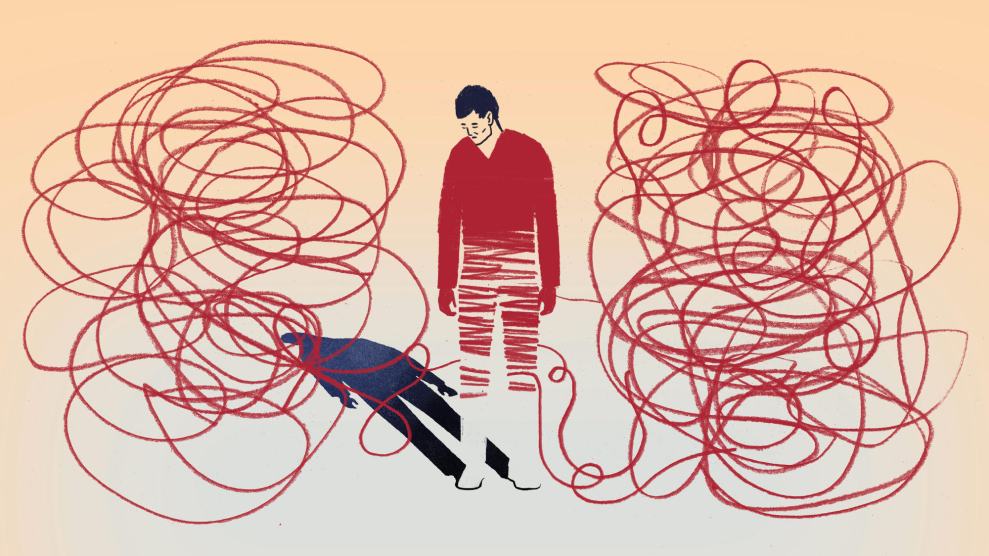
Keith Negley
Get your news from a source that’s not owned and controlled by oligarchs. Sign up for the free Mother Jones Daily.
A few days before the passage of President Donald Trump’s One Big Beautiful Bill, the White House released a “Myth vs. Fact” document to counter criticism of the inclusion of work requirements for Medicaid eligibility. The proposed new rules need not cause worry among Americans, the document implied, because only “able-bodied adults” would have to show proof of employment. In return, the administration claimed, the needy would gain something beyond mere federal health coverage: dignity.
For decades, Republicans (and austere liberals) have deployed the “able-bodied” trope to sell the public on employment as a condition of government assistance. In this context, the expression brings to mind capable workers glued to their sofas—“couch potatoes,” as former Florida Rep. Matt Gaetz once put it—eating junk food and playing video games while living on the government dole.
Putting aside the fact that nobody gets rich from the ability to see a doctor, the rhetoric is confounding. What does “able-bodied” mean?
It isn’t a term typically used by medical professionals. And the phrase is not, in fact, indicative of a vast slouching class—lots of disabled people have jobs. The vast majority of adult Medicaid recipients who can work already do; KFF reports that nearly two-thirds of those not enrolled in the Social Security disability programs are working full or part time. Most nonworking recipients have legitimate excuses, including retirement, caregiving, school, or an illness.
“Able-bodied” may sound like a medical determination, but, as disability activist Imani Barbarin told me, it’s really just a vague way “to signal this idea that disability can be seen.” Under this rubric, people with invisible disabilities that can make work extremely challenging—including psychiatric disabilities like bipolar disorder or chronic illnesses such as lupus—can be cast as lazy.
To many people, the notion that the “able-bodied” must labor sounds reasonable on its face, but it’s mostly just culture war; in reality, work requirements don’t meaningfully boost employment or do much to slash government debt.
The first Trump administration granted waivers to 13 states to allow them to impose Medicaid work requirements. Only Arkansas fully did so. But instead of creating a fairer, more efficient health care system, the policy was a disaster. The requirements caused a downturn in coverage with no increase in employment. (Eventually, the waivers were struck down by the courts or rescinded by the Biden administration.)
This failed experiment hasn’t swayed Republicans who still suggest that the problem with Medicaid is “able-bodied” nonworkers. When he introduced a bill to end “Obamacare’s Medicaid expansion” in May, Rep. Chip Roy (R-Texas) wrote that it was a “scam” that funds “illegal aliens and the able-bodied while racking up trillions in federal debt.”
This logic was used by backers of Trump’s big bill, which requires states to implement work requirements by January 2027. The mandate would give the entire nation a bit of that Arkansas magic: The Congressional Budget Office estimates it will result in at least 5.3 million people losing health coverage by 2034 simply because they will be unable to navigate the bureaucratic hurdles their states will impose.
This is not the first time such rhetoric has been used to hurt the poor. The weaponization of “able-bodied” hearkens back to ideas older than America. In 1351, after a wave of bubonic plague, England’s Parliament enacted the Statute of Labourers. The scourge had brought on a shortage of workers, and the law required that everyone under 68, “able in body,” and not wealthy had to work—at no more than pre-plague wages. “This tendency to fantasize—when times change and things aren’t what they were—that the poorest and most vulnerable are actually some sort of malicious freeloading class is a very old one,” medievalist Elise Wang, an assistant professor at California State University, Fullerton, pointed out on Bluesky.
When President Franklin D. Roosevelt established the minimum wage in 1938, he said the United States “should be able to devise ways and means of ensuring to all our able-bodied working men and women a fair day’s pay for a fair day’s work.” His language made the fault lines of disability explicit: The new law created an exception, which remains in place today, intentionally allowing some disabled workers to be paid less than minimum wage. Even when used in support of workers, the “able-bodied” language boomeranged on disabled people.
The myth of the lazy masses appeals, but it can’t stand up to reality.
In 1976, as he laid the groundwork for his own presidency, Ronald Reagan boasted that as California’s governor, he had “put able-bodied welfare recipients to work at useful community projects in return for their welfare grants.” A decade later, fewer than 10,000 people had taken part in that supposedly mandatory program, which was abandoned after Reagan left. The myth of the lazy masses appealed, but it couldn’t stand up to reality.
The same is true today. Trump and MAGA members of Congress have promised their bill will purge layabouts from the Medicaid rolls while protecting the vulnerable. But it mainly creates mountains of paperwork for busy families to climb. “A core approach that Republicans have here is tying everything up in administrative burdens and red tape to make things hard,” said Ben HsuBorger, US advocacy director for #MEAction, a nonprofit advocating for people with myalgic encephalomyelitis, also known as chronic fatigue syndrome. Some of them will be too sick to fight for an exemption from the work rules, HsuBorger predicts.
Another especially concerning wrinkle: Health and Human Services Secretary Robert F. Kennedy Jr., who is infamous for blaming chronic illnesses on people’s life choices, will have the power to define the parameters of those exemptions. Would RFK Jr. be sympathetic to someone with uncontrolled Type 2 diabetes who cannot work, or would he see them as “able-bodied”?
Even disabled people and older adults on Social Security disability programs ultimately may not be exempt, says Georgetown University public policy professor Edwin Park, “let alone all the other people with disabilities who are covered by Medicaid,” when we talked earlier this year.
When politicians say “able-bodied,” it’s a roundabout way of downplaying the challenges faced by people who have been left behind yet deemed capable enough to contribute to capitalism. But their language fails to hide the true message: The state does not want to help you.

